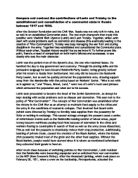Lenin soon proceeded to become the head of the Soviet Government. As always he kept dealing with social problems such as disease and starvation. This soon led to the policy of “War Communism”. The concept of War Communism was established after the victory in the Civil War as an attempt to maintain food supply to the cities and the army in the conditions of . That involved Red Guard units (which were directed by Trotsky) to forcibly take supplies from the peasantry for little or nothing in exchange. This caused outrage amongst the peasant cause a series of unfortunate events such as the Bolsheviks loosing control of wheat areas, paper money became worthless causing food riots because of starvation in the cities and workers fleeing to countryside in search of food as well as the army (mass dissection). This as well led the peasants to drastically reduce their crop production. Additionally, banning of private trade, caused the creation of the Black Market, where the Kulaks (rich peasants) traded most of the grain and the other food supplies. Without the Black Market, people would have starved since it is where as mentioned beforehand they collected their goods to feed on.
After much chaos because of switching policies to War Communism, Lenin realized that the Bolsheviks were becoming unpopular and so switched from war communism to the NEP (New Economic Policy). After the Kronstadt Uprising, which took place on February 28, 1921, when a crew on the battleship, Petropavlovsk, attacked the Bolsheviks because they wanted a return of full political freedoms, Trotsky soon ordered the Red army to attack the Kronstadt, in the end killing 527 and wounding 4,127. With the change of policies, farmers were now allowed to sell food on the open market. Those farmers who expanded the size of their farms became known as kulaks.
After the October Revolution in , which began as a dated to , , Lenin issued a series of land, peace and working condition decrees. This did not function correctly as planned and lead to hyperinflation and shortages of supplies. After an attempt of murdering Lenin, he issued Red Terror and ordered the execution of the Tsar and his family, plus the setting up of machines which directed the CHEKA. The CHEKA was set up as a form of terror to scare off opposition. It was created after Lenin began to notice that there were not enough members in the Bolshevik Party, this leading to him declaring it a “Dictatorship of the Proletariat”. Basically Lenin was the mastermind while Trotsky played out the actions in an organized manner, as seen in many occasions.
During the Civil War, Trotsky was in charge of the Red Army. He restored discipline to the army and brought back many Tsarist officers to train and command. In order to ensure their loyalty, Trotsky held their families hostage. Trotsky was good at organization and so when back up was needed in the war front, he traveled in a specially equipped train to the fighting site, providing support with a “special army”. All these contributions to the set up of the Communist state on behalf of Trotsky were no small achievement since because of his overall charge, holding things together and making organization work effectively, is the reason to why the Reds won the Civil War.
He was considered to be “personally the most capable man in the present central committee” (written by Lenin in his Testament, 1922) this reassuring his status as a wistful tactical man. He organized the November Revolution as well as becoming chairman of the Military Revolution Committee, later becoming member of the Politburo. Although not as good orator as Lenin, but Trotsky managed to organize the Treaty of Brest-Litovsk, which was a peace treaty signed on March 3, 1918 announcing the withdrawal of Russia from World War One. Trotsky, tired with continuous demands for cessions of territory on behalf of Germany, withdrew from negotiations. Bolshevik leaders had originally entered the peace talks in the hope of exposing their enemies' territorial ambitions and rousing the workers of to in defense of Russia's new workers' state.
Trotsky single handedly won the civil war rebuilding the Russian Army based on the Red Guards, increased number of troops 7,000 to 5 million, organized supply weapons and food for army and forced troops to fight even in the severest conditions such as the Kronstadst Revolt.
In conclusion, both Vladimir Lenin and Leon Trotsky were two of the greatest intellects of the 20th century, being the two towering figures of the Russian Revolution making great contributions to the establishment of the Communist party. Without either, the Bolshevik Party as we know it would not have maintained support thanks to Lenin’s contributions managing day to day government (Sovnarkom), dealing with social problems and concentration on consolidating the Communist state. Of course none of this would have been manage to be done without Trotsky’s contribution as well because of his organization, discipline and managing of the Red Army (which if not done correctly would have gotten in the way).
Bibliography:
-
Wikipedia, “Lenin’s testamente”,
-
Wikipedia, “Leon Trotsky”,
- Wikipedia, “Vladimir Lenin”, www.wikipedia.org
- Chris Corin, Communist Russia, John Murray LTD, 2002
Word Count: 1,076







